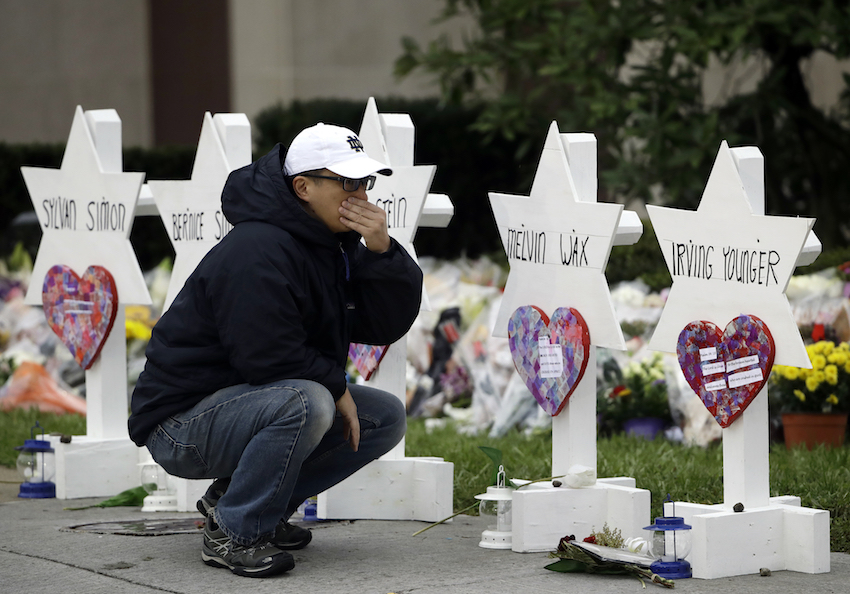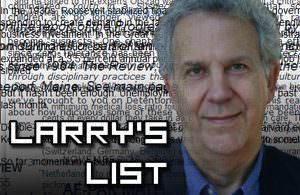Trump’s Role in the Tree of Life Massacre
The president's hateful words must be confronted and fought. A mourner pauses at Stars of David bearing the names of those killed in the shooting at the Tree of Life synagogue in Pittsburgh. (Matt Rourke / AP)
A mourner pauses at Stars of David bearing the names of those killed in the shooting at the Tree of Life synagogue in Pittsburgh. (Matt Rourke / AP)
It doesn’t take much to set off the racism that has always been an undercurrent in American life. The nativist scorn for the foreign-born and their descendants is always ready to explode, as is the oppression of the dark-skinned; and, as we were reminded again in Pittsburgh on Saturday, the hatred of Jews.
To the Southern Poverty Law Center, the attack on the Tree of Life synagogue, in which 11 were killed, “Reminds us of the slaughter of nine African Americans at Charleston’s Mother Immanuel Church in 2015, the killings of six Sikh worshippers at a temple in Oak Creek, Wisc., the bombing of Birmingham’s 16th Street Baptist Church (where four African American girls were killed).”
Jonathan A. Greenblatt, CEO of the Anti-Defamation League, an organization that has been a leading fighter against anti-Semitism for many decades, said, “We believe this is the deadliest attack on the Jewish community in the United States.”
The attack didn’t come out of nowhere. The ADL reported the number of anti-Semitic incidents in the United States rose 57 percent in 2017, the largest single increase on record. In addition, the ADL said there was an increase in neo-Nazi groups, a doubling of hate-motivated murders, and an increase in white supremacist propaganda on college campuses, as well as in elementary and high schools.
That is why it is important now, after the slaughter in the Tree of Life Congregation, to give some thought to the speeches, tweets and random thoughts of President Donald Trump, whose words, rather than calming the nation in this trying time, are further inflaming it.
His messages in rallies and tweets spread anger and fear among his political base to increase the Republican vote in the midterm elections. At a rally in Charlotte, N.C., Friday, the night before the Pittsburgh shooting, he said, “The Democrats want to invite caravan after caravan of illegal immigrants into our country, and they want to sign up them for free health care, welfare, and they want to sign them up for the right to vote.”
Did words like these influence Robert Bowers, charged with the murders of 11 in the synagogue? Bowers, himself, threatened immigrants and he spread his anti-Semitic venom on the darkest reaches of the internet, notably on the social media site Gab, a home for white nationalists. Trump, actually, was too soft on his targets for Bowers.
Bowers combined his loathing of Jews and immigrants in his attacks on the Hebrew Immigrant Aid Society, HIAS, founded in 1881 to help Jews escape Russian pogroms and now assisting all refugees and asylum seekers. He blamed HIAS for the caravan of immigrants making its way from Honduras through Mexico to the U.S. border, and, in a post just before the shooting, said, “I can’t sit by and watch my people get slaughtered. Screw your optics, I’m going in.” He had an arsenal of guns.
Equally deluded was Cesar Sayoc, accused of mailing bombs to prominent anti-Trump figures around the country. A Trump obsessive, he plastered his van with pro-Trump material, including attacks on immigrants.
There’s no doubt that Trump, with his rhetoric, has encouraged hatred of the “other”: those who are not nationalistic white Anglo-Saxon Christians. Neo-Nazis hold these feelings. Though only a minority of Americans, they have shown there are enough of them to make trouble.
Let’s look at Trump’s own relationship with Jews.
While getting only about 25 percent of the Jewish vote, Trump has strong support among Orthodox Jews and those supporting Israeli Prime Minister Benjamin Netanyahu and his hard line against the Palestinians. Among them is Sheldon Adelson, the very wealthy Las Vegas casino owner who contributes millions to Republicans.
Trump’s daughter Ivanka converted to Judaism and is raising a Jewish family after marrying Jared Kushner, an Orthodox Jew. Kushner is now a Trump adviser, after a career in his family’s real estate business. Among other Jews in the administration are Treasury Secretary Steve Mnuchin; David Friedman, ambassador to Israel; and Stephen Miller, mastermind behind Trump’s anti-immigrant policies.
In a post-Pittsburgh column headlined, “Cry, Don’t Politicize,” Shmuel Rosner wrote in the Jewish Journal, “There is no doubt that the President is not a Jew hater, does not encourage or condone hate of Jews, does not aim to hurt Jews. … [B]laming him is a fool’s errand. Trump has many followers. Most of them bear no ill will against Jews.” He warned that denouncing Trump would hurt the Jews. “… [I]f the Jews make the president their prime target of criticism—if they portray him and his supporters as anti-Semitic haters—alienation will follow, and anger,” Rosner wrote.
Rosner and those like him are urging Jews to turn the other cheek.
John Podhoretz, editor of Commentary and a leading Jewish intellectual, offered just mild criticism of Trump. “Where I won’t let Trump off the hook here is the way in which he does nothing to try to calm the political atmosphere and rather seeks to secure an advantage from the way it roils. He should be better than this, because everyone should, and he’s not, and that’s both sad and bad. He’s just not a good person, and there are times, times like these, when the country would benefit from having a better person as president.”
Podhoretz’s hope for a “better person” as president and Rosner’s headline advice to “Cry, Don’t Politicize” ignore an atmosphere that is increasingly dangerous to Jews, to minorities of color and to immigrants and their families.
We Jews ignore history if we paper over Trump’s words as just “Trump being Trump” or dismiss the accused synagogue shooter and the suspected bomber as deluded nuts acting in a vacuum.
Unfortunately, there is a temptation in parts of the Jewish community to want to work things out, behind the scenes if possible, to avoid an ugly confrontation.
But anti-Semitism is too old and too deeply rooted to permit this, going back to the pre-medieval blaming of Jews for the death of Christ and accusing them of the ritual murder of Christians, the infamous blood libel. Although a minority, Jews have been blamed for everything. Most were poor, but they were portrayed as Shylocks, part of a mysterious cabal of international bankers.
These lies took hold in New York and Los Angeles, the cities with the most Jews. And, as is the case today, the community was divided on how to deal with them. In his excellent history “Hitler in Los Angeles,” Steven J. Ross details the rise of Nazis in Los Angeles and the movie business. Jews argued over how to confront Hitler. Some wanted to fight back. Others, Ross said, thought attacking Hitler would make things worse for the Jews. As a boy, I wanted the Jews to fight back and immersed myself in stories of when—as in the Warsaw Ghetto—they did.
From the time he emerged as a candidate, Trump played the Shylock theme familiar to those who knew their history.
For example, in October 2016 he evoked the image of the mysterious international banker: “We’ve seen first hand in the WikiLeaks documents in which Hillary Clinton meets in secret with international banks to plot the destruction of U.S. sovereignty in order to enrich these global financial powers, her special interest friends and her donors.”
Commenting on the speech, the ADL’s Jonathan Greenblatt said, “Whether intentionally or not, Donald Trump is evoking classic anti-Semitic themes that have historically been used against Jews and still reverberate today.”
And reverberate they do, from the grimy recesses of social media sites such as Gab, working their way into the political debate on cable television and on the internet where they are surefire viewer clickbait.
Most likely, there are other Robert Bowerses and Cesar Sayocs lurking out there absorbing this stuff. The recipients of the bombs, and American Jewry, now know what is the ugly truth for African-Americans, Latinos and others: There is no safety from hate or hateful words. They must be confronted and fought.
Your support matters…Independent journalism is under threat and overshadowed by heavily funded mainstream media.
You can help level the playing field. Become a member.
Your tax-deductible contribution keeps us digging beneath the headlines to give you thought-provoking, investigative reporting and analysis that unearths what's really happening- without compromise.
Give today to support our courageous, independent journalists.








You need to be a supporter to comment.
There are currently no responses to this article.
Be the first to respond.